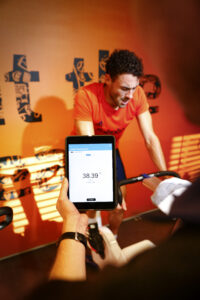The full paper can be found here
Tell us more about yourself and the author team.
My name is Lennart Teunissen, I’m a human movement scientist, with expertise in exercise and thermal physiology. I conducted the current study as a postdoctoral researcher at the Faculty of Industrial Design Engineering, Delft University of Technology, which was involved in the Thermo Tokyo project on the topics of cooling technology and thermal simulation. I’m currently employed at the Royal Netherlands Army.
Kaspar Jansen is full professor of Emerging Materials at the Faculty of Industrial Design Engineering of Delft University of Technology. In his research, he focuses on smart textiles and textile-based sensors/actuators, including solutions on thermophysiological challenges.
Emiel Jansen participated as an MSc student in Industrial Design Engineering in the Thermo Tokyo project and contributed to the creative design of the artwork and figures of the manuscript.
Boris Kingma works at the Netherlands Organisation for Applied Scientific Research (TNO) on analyses and product development in the thermal domain by combining physics, physiology and computer science. His vast experience on thermal modelling contributed greatly to this project.
Yannick de Korte is a PhD student in Thermal Physiology at the Department of Physiology of the Radboud University Medical Center. Yannick coordinated the data collection of the Thermo Tokyo project and published several articles on the thermophysiological responses of elite athletes using the Thermo Tokyo dataset.
Thijs Eijsvogels is an associate professor at Radboud University Medical Center and the principal investigator of the Thermo Tokyo project. Thijs is an exercise physiologist with expertise in the effects of exercise on thermoregulation, including the use of heat mitigation measures to attenuate the effect of heat on health and performance outcomes.

What is the story behind your study?
The Thermo Tokyo project involves a consortium of academic, industrial and sports organizations that aimed to optimally prepare the Dutch Olympic Team for the expected heat and humidity at the Tokyo Olympics. An important part of the project was to test the Olympic athletes in hot (Tokyo-like) conditions, evaluate their heat tolerance and assist them with the implementation of heat mitigation measures. However, testing opportunities were limited due to their busy training schedules. In order to assess the effects of slight variations in the local climate on thermoregulatory responses and performance indicators, we used the detailed phenotypic data of athletes that were captured during exercise tests in the climatic chamber to feed into the Fiala model. This way, we could provide more accurate recommendations to athletes and coaches across a large variety of climatic conditions.
In your own words, what did you find?
As expected, more strenuous conditions led to a higher core temperature for a similar workout. More interestingly, we found that, within realistic Tokyo ranges, variation in ambient temperature seemed to have more impact than variation in relative humidity. And that a combination of several unfavourable climatic factors had a greater impact on core temperature than the cumulative effect of individual factors. Furthermore, we found that such simulations, with the appropriate input parameters available, can provide valuable information in preparation for future high-level exercise events and championships in challenging thermal environments.
What was the main challenge you faced in your study?
The key challenge of this project was to align the interest of all involved stakeholders (e.g. elite athletes, coaches, embedded scientists, sports associations, and team physicians) as well as the collection and processing of a large amount of data (e.g. anthropometric, physical, physiological parameters). However, to run appropriate computer simulations, it was essential to collect high-quality input data with our multidisciplinary team.
If there is one take-home message from your study, what would that be?
Thermal simulation can provide useful insights into thermoregulatory responses and performance indicators during exercise under different climatic conditions, enabling sports professionals to evaluate the separate and combined effects of multiple scenarios.